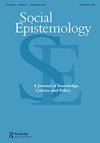其他导向的解释学不公正,受影响的无知,还是人类的无知?
IF 2
2区 哲学
Q1 HISTORY & PHILOSOPHY OF SCIENCE
引用次数: 0
摘要
摘要保罗-米哈伊尔·波多斯基引入了他者导向的解释学不公正的概念,认为非人类动物往往是这种不公正的主体。在本文中,我认为,尽管他者导向的解释学不公正的概念是连贯的,但波多斯基的例子——包括他的非人类动物的主要案例——并不是它的实例。我试图证明无知的认识论为波多斯基的论证提供了更好的理论基础。在论文的最后一部分,我讨论了一个案例,乍一看,似乎是一个以他者为导向的解释学不公正。然而,我认为无知的认识论最终会给我们一个更好的解释。关键词:认识论的不公正;解释学的不公正;无知认识论;这篇文章经过了细微的修改。这些变化不影响文章的学术内容。正如Medina所指出的,Fricker在(Citation2007, 160).2中承认了基于绩效的认知不公正。洛佩兹(引文即将出版)认为,尽管非人类动物不能成为证言或解释学上的不公正的主体,但它们可以成为另一种认识上的不公正的主体。洛佩兹关注的是人类和非人类动物都拥有的技能或“诀窍”知识。非人类动物有兴趣获得关于环境、物种其他成员等的真实信念,当这种获取被破坏时,它们就会遭受认知不公正的痛苦。洛佩兹认为,这种认知上的不公正并不要求一个人必须投入到被认可为知者的过程中。因此,这里的危害将与弗里克所讨论的完全不同。由于我试图确定弗里克的解释学不公正的概念是否可以扩展到包括以他人为导向的解释学不公正,我使用弗里克对作为一个知者的身份受到伤害的含义的解释。但请参阅洛佩兹(引文即将出版)的论点,即存在不需要一个人被认可为知者的认知不公正。重要的是,解释学上的不公正不是其中之一。米尔斯指出,白人的无知并不局限于白人。参见(Citation2007, 22ff)。白人的无知和证词的不公正也有联系。证词的不公正可能是白人无知所特有的偏见和误解的结果。这个案子是根据伊恩·麦克尤恩的小说《永恒的爱》改编的。在Fricker (Citation2016)中,Fricker讨论了白人无知和解释性不公正之间的差异。她认为有两个主要的区别:(1)白人的无知通常在认识论上是有罪的,但在解释学上的不公正不是;(2)白人的无知通常不涉及概念的缺乏,但解释学上的不公正总是涉及概念的缺乏。我认为,如果有人认为白人的无知是系统性的、基于群体的认知失败,那么这种认识论的罪责主张就会受到挑战。诚然,一些关于白人无知的文献将其视为个人的故意无知。参见Martin (Citation2021)进行讨论。我在这里稍微简化了波多斯基的叙述。他引用了图式的概念。图式是“使社会行动者能够有效组织和响应信息的心理结构”(Podosky citation2018,220)。公开共享的含义是模式。它们是内化的,是社会人相互交流的基础。由于显而易见的原因,我在这里省略了偏见性证言判断的规定。请注意,本·卡森是黑人。米尔斯很清楚,“白人无知”中的“白人”并不局限于白人。参见Mills (Citation2007)。本研究由东密歇根大学资助的一项学院研究奖学金资助。关于贡献者的说明。m . DieterleJ。迪特勒是东密歇根大学的哲学教授。她是环境科学与社会项目和严重残疾项目的教员成员。她的主要研究领域是食品伦理/食品正义。本文章由计算机程序翻译,如有差异,请以英文原文为准。
Other Oriented Hermeneutical Injustice, Affected Ignorance, or Human Ignorance?
ABSTRACTPaul-Mikhail Podosky introduces the notion of other-oriented hermeneutical injustice and argues that non-human animals are often the subjects of such injustice. In this paper, I argue that although the notion of other-oriented hermeneutical injustice is coherent, Podosky’s examples – including his primary case of non-human animals – are not instances of it. I attempt to show that an epistemology of ignorance serves as a better theoretical basis for Podosky’s argument. In the final section of the paper, I discuss a case that, at first glance, seems to be one of other-oriented hermeneutical injustice. However, I argue that ultimately an epistemology of ignorance gives us a better account of the case.KEYWORDS: Epistemic injusticehermeneutical injusticeepistemology of ignorancenon-human animals Disclosure StatementNo potential conflict of interest was reported by the author(s).Correction StatementThis article has been corrected with minor changes. These changes do not impact the academic content of the article.Notes1. As Medina notes, Fricker acknowledges performatively-based epistemic injustices in (Citation2007, 160).2. Lopez (Citationforthcoming) argues that although non-human animals cannot be the subjects of testimonial or hermeneutical injustice, they can be the subjects of another kind of epistemic injustice. Lopez focuses on skill or ‘know-how’ knowledge, which both human and non-human animals possess. Non-human animals have interests in acquiring true beliefs about their environment, other members of their species, etc., and when this acquisition is disrupted, they can suffer from epistemic injustice. Lopez argues that this kind of epistemic injustice does not require that one must be invested in being recognized as a knower. Thus the harm here will be decidedly different from that Fricker discusses.3. Since I am attempting to determine whether Fricker’s notion of hermeneutical injustice can be expanded to include other-oriented hermeneutical injustice, I use Fricker’s account of what it means to be harmed in one’s capacity as a knower. But see Lopez (Citationforthcoming) for an argument that there are kinds of epistemic injustice that do not require that one be invested in being recognized as a knower. Importantly, hermeneutical injustice is not one of them.4. Mills notes that white ignorance is not confined to whites. See (Citation2007, 22ff).5. There are connections between white ignorance and testimonial injustice, too. Testimonial injustices can be the result of the biases and misunderstandings that are endemic to white ignorance.6. The case is based on Enduring Love, a novel by Ian McEwen.7. In Fricker (Citation2016), Fricker discusses the differences between white ignorance and hermeneutical injustice. She argues that there are two primary differences: (1) white ignorance is usually epistemically culpable but hermeneutical injustice is not; (2) white ignorance does not generally involve a lack of concepts, but hermeneutical injustice always does. I think the epistemic culpability claim can be challenged if one thinks of white ignorance as systemic, group-based epistemic failures. Granted, some of the literature on white ignorance treats it as willful ignorance on the part of individuals. See Martin (Citation2021) for discussion.8. I have simplified Podosky’s account somewhat here. He invokes the notion of a schema. Schemas are ‘psychological structures that enable social agents to organize and respond to information efficiently’ (Podosky Citation2018, 220). Publicly shared meanings are schemas. They are internalized and serve as a basis for social beings to communicate with one another.9. I omit here the prescription of prejudicial testimonial judgments, for obvious reasons.10. Note that Ben Carson is Black. Mills is clear that the ‘white’ in ‘white ignorance’ is not confined to white people. See Mills (Citation2007).Additional informationFundingThis work was supported by a Faculty Research Fellowship funded by Eastern Michigan University.Notes on contributorsJ. M. DieterleJ. M. Dieterle is a Professor of Philosophy at Eastern Michigan University. She is a Faculty Affiliate in the Environmental Science and Society program and the Critical Disabilities program. Her primary area of research is food ethics/food justice.
求助全文
通过发布文献求助,成功后即可免费获取论文全文。
去求助
来源期刊

Social Epistemology
Multiple-
CiteScore
2.60
自引率
17.60%
发文量
60
期刊介绍:
Social Epistemology provides a forum for philosophical and social scientific enquiry that incorporates the work of scholars from a variety of disciplines who share a concern with the production, assessment and validation of knowledge. The journal covers both empirical research into the origination and transmission of knowledge and normative considerations which arise as such research is implemented, serving as a guide for directing contemporary knowledge enterprises. Social Epistemology publishes "exchanges" which are the collective product of several contributors and take the form of critical syntheses, open peer commentaries interviews, applications, provocations, reviews and responses
 求助内容:
求助内容: 应助结果提醒方式:
应助结果提醒方式:


